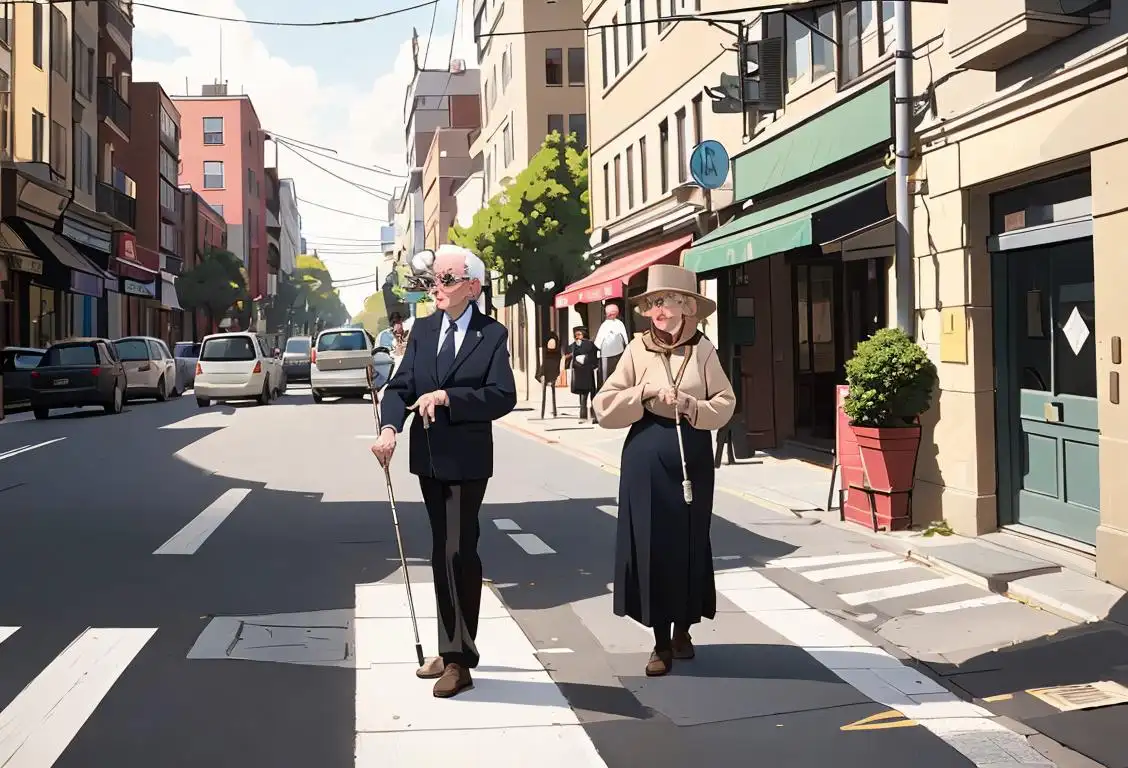National White Cane Safety Day

Welcome to the wonderfully obscure world of National White Cane Safety Day! Prepare to be amazed as we delve into the fascinating history of this day dedicated to raising awareness for the safety and independence of those who rely on white canes.
When is White Cane Safety Day?
It's national white cane safety day on the 15th October.
The Birth of National White Cane Safety Day
Picture this: It's 1964, and a group of visually impaired individuals gather in the nation's capital, armed with canes painted entirely white. No, they're not trying to audition for a modern art exhibition. These brave pioneers were advocating for increased safety measures for those with visual impairments.
Their efforts did not go unnoticed, and on October 15, 1964, President Lyndon B. Johnson signed a proclamation declaring this day as National White Cane Safety Day. Since then, it has been recognized annually as a day to promote awareness and educate the public about the challenges faced by those with visual impairments.
Spreading Awareness and Promoting Independence
White canes are more than just mobility aids; they are a symbol of independence and freedom for the visually impaired. National White Cane Safety Day encourages communities to recognize the important role white canes play in the lives of those who use them.
Through various events and activities, people come together to learn about white cane etiquette, raise funds for organizations supporting the visually impaired, and provide support to individuals and their loved ones.
Did You Know?
Did you know that the longest white cane measures a whopping 141.79 meters (465 feet 9.6 inches) long? That's longer than the height of the Statue of Liberty's torch! Talk about making a grand entrance!
History behind the term 'White Cane Safety'
1921
The Introduction of the White Cane
In 1921, James Biggs, a photographer from Bristol, England, became the first person to use a white cane for navigation. Biggs painted his walking stick white to be more visible after he lost his sight in an accident. This simple adaptation helped him and others with visual impairments traverse the city streets with greater safety.
1930
The Use of White Canes in America
The concept of using a white cane as an aid for individuals with visual impairments gained recognition in the United States in the 1930s. Advocates for the blind, such as Lions Clubs International, played a crucial role in promoting the use of white canes as a symbol of visibility and safety for pedestrians with sight loss.
August 10, 1964
National White Cane Safety Day
To commemorate the importance of white canes in promoting safety and independence for individuals with visual impairments, October 15th was proclaimed as National White Cane Safety Day in the United States. This day encourages public awareness of white cane usage and emphasizes the rights of pedestrians with blindness or low vision.
September 16, 1978
White Cane Safety Day Becomes a National Observance
In 1978, White Cane Safety Day was officially recognized as a national observance in the United States through legislation signed by President Jimmy Carter. The day serves as a reminder of the skills, independence, and contributions of individuals who are visually impaired and rely on white canes for mobility.
Present
Global Adoption of White Cane Safety
Since its inception, the concept of white cane safety has spread worldwide. Many countries now recognize specific days or weeks dedicated to promoting awareness of white canes and the rights of pedestrians with visual impairments. The International White Cane Safety Day is observed on October 15th, emphasizing the significance of these mobility aids worldwide.
Did you know?
Did you know that the longest white cane measures a whopping 141.79 meters (465 feet 9.6 inches) long? That's longer than the height of the Statue of Liberty's torch!Tagged
awareness fun loved onesFirst identified
15th October 2015Most mentioned on
15th October 2015Total mentions
65Other days
Compliment Day
Cheese Pizza Day
Pumpkin Day
Medal Of Honor Day
Guac Day
Foundation Day
Suicide Prevention Day
Memorial Day
Cancer Survivors Day
Bacon Day









